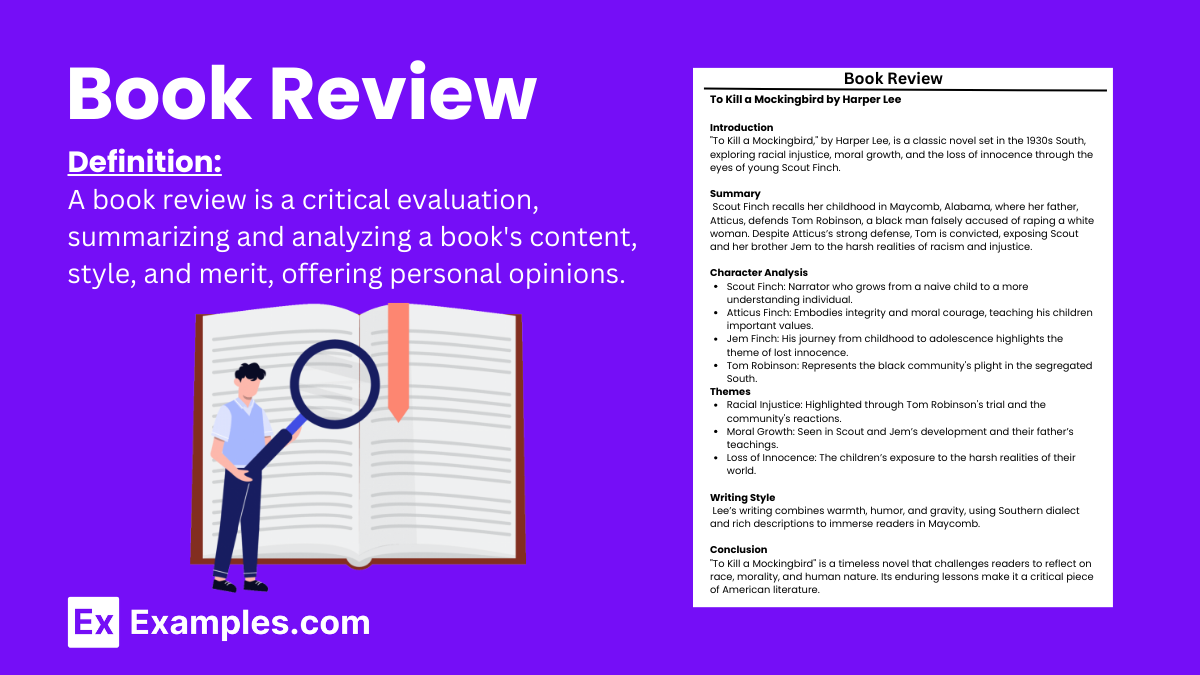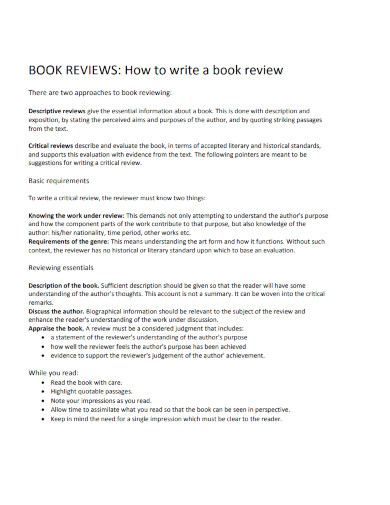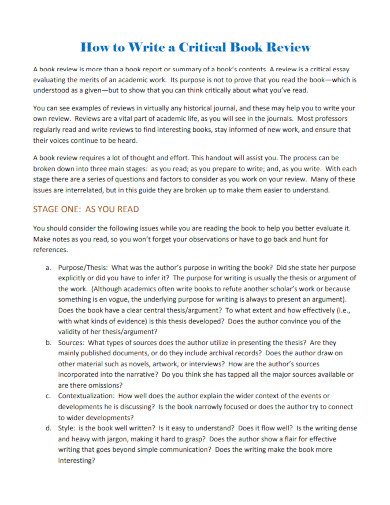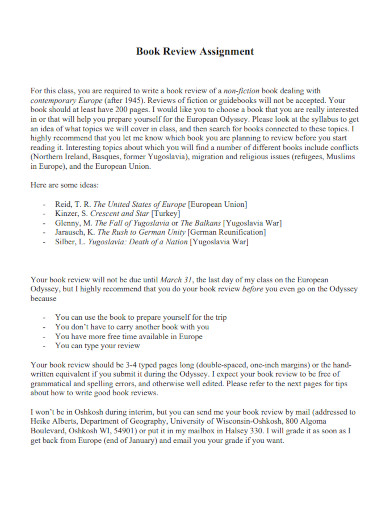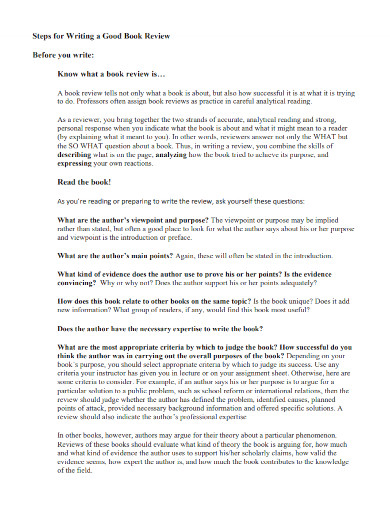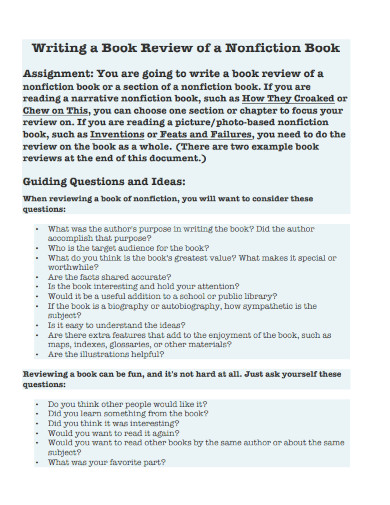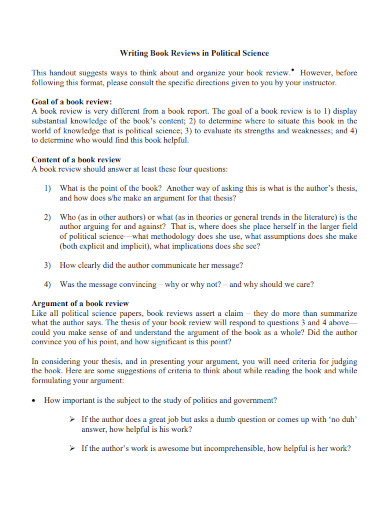10+ Book Review Examples to Download
Book reviews are an essential part of literature review and criticism, providing readers with an overview of a book’s content, style, text structure, and quality. They offer readers an insight into the author’s writing and provide an assessment of the book’s strengths and weaknesses. Book reviews are written by professional book reviewers, literary critics, and even readers who have read the book and want to share their opinion with others. Other readers, or the author, would also reply to the critic with an argument essay.
What is a Book Review?
A book review is a critical evaluation of a book, where the reviewer shares their analysis, opinions, and overall assessment of the book’s content, style, and merit. It includes a summary of the book’s key points, an evaluation of its strengths and weaknesses, and a recommendation for potential readers. Book reviews help readers decide whether a book is worth reading.
Book Review Format
When writing a book review, it’s essential to follow a structured format that includes specific elements. Below is a detailed guide to help you create an engaging and comprehensive book review.
1. Introduction
- Book Title and Author: Clearly state the title of the book and the author’s name.
- Publication Details: Include the publisher, publication date, and edition if relevant.
- Genre: Mention the genre of the book (e.g., fiction, non-fiction, mystery, fantasy).
- Brief Overview: Provide a brief overview or summary of the book’s premise without giving away any spoilers.
Example: To Kill a Mockingbird by Harper Lee, published by J.B. Lippincott & Co. in 1960, is a classic piece of American literature. This novel falls within the historical fiction genre and explores deep themes of racial injustice and moral growth through the eyes of young Scout Finch.
2. Summary
- Main Plot: Summarize the main plot points of the book in a concise manner.
- Setting: Describe the time and place where the story occurs.
- Main Characters: Introduce the main characters and their roles in the story.
Example: Set in the racially segregated South during the 1930s, the novel follows Scout Finch, her brother Jem, and their father Atticus, a principled lawyer. When Atticus defends a black man falsely accused of raping a white woman, the family faces hostility from the community. The story is a poignant exploration of racial tensions and moral integrity.
3. Analysis
- Themes: Discuss the main themes and messages of the book.
- Character Development: Analyze the growth and complexity of the main characters.
- Writing Style: Comment on the author’s writing style and how it contributes to the story.
- Pacing and Structure: Evaluate the pacing of the plot and the structure of the book.
Example: Harper Lee masterfully addresses themes of racism, moral courage, and the innocence of childhood. Through Scout’s eyes, we witness her coming-of-age and grappling with the harsh realities of her society. Lee’s descriptive prose and authentic dialogue create an immersive and emotionally charged narrative.
4. Personal Reflection
- Personal Connection: Share your personal connection to the book and how it impacted you.
- Strengths and Weaknesses: Highlight the strengths and any weaknesses you perceived in the book.
- Favorite Part: Mention any part or aspect of the book that stood out to you.
Example: Reading To Kill a Mockingbird was a profound experience. The book’s exploration of morality in the face of prejudice resonated deeply with me. While the pacing in some parts felt slow, the rich character development and powerful themes more than compensated for it. Atticus Finch’s unwavering integrity remains my favorite aspect of the book.
5. Conclusion
- Overall Impression: Provide your overall impression of the book.
- Recommendation: State whether you would recommend the book and to whom.
- Rating: Optionally, include a rating out of 5 or 10.
Example: Overall, To Kill a Mockingbird is a beautifully crafted novel that offers valuable insights into human nature and social justice. I highly recommend this book to readers of all ages, particularly those interested in historical fiction and ethical dilemmas. I would rate it 4.5 out of 5 stars.
6. Additional Information (Optional)
- Author’s Background: Briefly discuss the author’s background and other notable works.
- Comparison: Compare the book to other similar works or the author’s other books.
- Discussion Questions: Provide a few questions for further discussion or book clubs.
Example: Harper Lee, born in 1926 in Alabama, is best known for To Kill a Mockingbird, her only novel until the release of Go Set a Watchman in 2015. Her portrayal of Southern life and deep moral questions sets her apart from other authors in the genre.
Example of Book Review
“To Kill a Mockingbird” by Harper Lee
Introduction
To Kill a Mockingbird by Harper Lee, published by J.B. Lippincott & Co. in 1960, is a classic piece of American literature. This novel falls within the historical fiction genre and explores deep themes of racial injustice and moral growth through the eyes of young Scout Finch.
Summary
Set in the racially segregated South during the 1930s, the novel follows Scout Finch, her brother Jem, and their father Atticus, a principled lawyer. When Atticus defends a black man falsely accused of raping a white woman, the family faces hostility from the community. The story is a poignant exploration of racial tensions and moral integrity.
Analysis
Harper Lee masterfully addresses themes of racism, moral courage, and the innocence of childhood. Through Scout’s eyes, we witness her coming-of-age and grappling with the harsh realities of her society. Lee’s descriptive prose and authentic dialogue create an immersive and emotionally charged narrative. The character of Atticus Finch stands out as a paragon of virtue and empathy, serving as a moral guidepost for both Scout and the readers. The pacing of the book, though steady, allows for deep character development and a thorough exploration of its themes.
Personal Reflection
Reading To Kill a Mockingbird was a profound experience. The book’s exploration of morality in the face of prejudice resonated deeply with me. While the pacing in some parts felt slow, the rich character development and powerful themes more than compensated for it. Atticus Finch’s unwavering integrity remains my favorite aspect of the book. The trial scenes were particularly impactful, highlighting the deep-seated injustices of the time.
Conclusion
Overall, To Kill a Mockingbird is a beautifully crafted novel that offers valuable insights into human nature and social justice. I highly recommend this book to readers of all ages, particularly those interested in historical fiction and ethical dilemmas. I would rate it 4.5 out of 5 stars.
Additional Information
Harper Lee, born in 1926 in Alabama, is best known for To Kill a Mockingbird, her only novel until the release of Go Set a Watchman in 2015. Her portrayal of Southern life and deep moral questions sets her apart from other authors in the genre. This book is often compared to other great American novels such as The Adventures of Huckleberry Finn by Mark Twain, both dealing with themes of race and morality.
Example of Book Review for Students
“Charlotte’s Web” by E.B. White
Introduction
Charlotte’s Web by E.B. White, published by Harper & Brothers in 1952, is a classic children’s novel that tells the story of a pig named Wilbur and his friendship with a spider named Charlotte. This book is a staple in children’s literature and has been cherished by generations of readers.
Summary
Wilbur, the runt of the litter, is saved from an untimely death by a girl named Fern. He is sent to live on her uncle’s farm, where he meets Charlotte, a wise and kind spider. When Wilbur’s life is again threatened, Charlotte writes messages in her web praising Wilbur, which amaze the humans and save his life. The story ends with the changing of seasons and Charlotte’s passing, leaving behind her legacy through her offspring.
Analysis
E.B. White’s Charlotte’s Web is a heartwarming tale about friendship, loyalty, and the cycle of life. The author’s gentle prose and vivid descriptions bring the farm to life, making readers feel as if they are part of Wilbur and Charlotte’s world. Themes of sacrifice and the power of words are central to the story, teaching young readers about the impact of kindness and creativity. The characters are well-developed, each with their own unique personalities that add depth to the story.
Personal Reflection
Charlotte’s Web is a touching story that has stayed with me since childhood. The bond between Wilbur and Charlotte is beautifully depicted, and the lessons of friendship and selflessness are profound. The book’s ending, while bittersweet, is a poignant reminder of life’s natural progression. Charlotte’s cleverness and dedication to saving Wilbur are inspirational, showing the true meaning of friendship and love.
Conclusion
Charlotte’s Web is a timeless story that continues to resonate with readers of all ages. It’s a must-read for elementary and middle school students, offering valuable lessons in compassion and the importance of friendship. I would rate it 5 out of 5 stars for its enduring charm and profound messages.
Example of Book Review for College Students
“1984” by George Orwell
Introduction
1984 by George Orwell, published by Secker & Warburg in 1949, is a seminal work of dystopian fiction. The novel explores themes of totalitarianism, surveillance, and the manipulation of truth in a society dominated by a tyrannical regime. Orwell’s chilling depiction of a future where individuality and freedom are systematically obliterated remains profoundly relevant today.
Summary
Set in a grim future where the Party, led by the enigmatic Big Brother, exerts absolute control over all aspects of life, 1984 follows Winston Smith, a low-ranking member of the Party. Winston works at the Ministry of Truth, where his job is to alter historical records to fit the Party’s ever-changing narratives. Disillusioned with the oppressive regime, Winston begins a covert rebellion by starting an illicit love affair with Julia and seeking the truth about the Party’s deceptions. As Winston delves deeper into his quest for truth, he encounters the brutal reality of the Party’s power and the futility of resistance.
Analysis
Orwell’s 1984 is a masterclass in dystopian literature, vividly illustrating the dangers of totalitarianism and the pervasive power of propaganda. The novel’s bleak setting and oppressive atmosphere effectively convey the sense of hopelessness that pervades Winston’s world. Themes of surveillance, control, and the malleability of truth resonate strongly, especially in the context of contemporary debates about privacy and government overreach.
Orwell’s writing is both stark and evocative, immersing readers in the nightmarish reality of Oceania. The character of Winston Smith serves as a poignant representation of human vulnerability and the yearning for freedom. His tragic arc underscores the novel’s central message about the destructive potential of absolute power.
Personal Reflection
Reading 1984 as a college student, I found Orwell’s exploration of power dynamics and ideological control to be profoundly thought-provoking. The novel’s portrayal of a society stripped of individuality and truth resonated deeply, prompting reflection on the importance of critical thinking and resistance to authoritarianism. Winston’s futile struggle against the Party’s omnipotence was both heartbreaking and a stark reminder of the fragility of human rights.
Conclusion
1984 is an essential read for college students, offering critical insights into the mechanisms of control and the importance of safeguarding democratic values. Orwell’s chilling vision of a dystopian future serves as a powerful warning against the perils of totalitarianism and the erosion of truth. I highly recommend this novel for its timeless relevance and profound impact. I would rate it 5 out of 5 stars.
More Samples & Examples of Book Review in PDF
1. Writing a Book Review
2. Write a Critical Book Review
3. Book Review Assignment Example
4. Steps for Writing a Good Book Review
5. Writing a Book Review of a Nonfiction Book
6. Writing Book Reviews in Political Science
Common Mistakes to Avoid in Book Reviews
Writing a book review requires a careful balance of summarizing the content, providing analysis, and offering a critical assessment. Here are some common mistakes to avoid to ensure your book review is effective and insightful:
1. Spoilers
- Mistake: Revealing too much of the plot, including twists, climaxes, and the ending.
- Avoidance: Provide a brief summary without giving away key plot points. Maintain the element of surprise for readers who have not yet read the book.
2. Lack of Structure
- Mistake: Writing a review without a clear structure, making it hard for readers to follow your thoughts.
- Avoidance: Organize your review with clear sections: Introduction, Summary, Analysis, Critical Assessment, Conclusion, and (if applicable) Personal Reflection.
3. Overly Negative or Positive Bias
- Mistake: Being overly harsh or excessively praising without providing balanced criticism.
- Avoidance: Offer a fair assessment, highlighting both the strengths and weaknesses of the book. Ensure your review is balanced and objective.
4. Inadequate Analysis
- Mistake: Focusing too much on the plot summary and not enough on analysis and evaluation.
- Avoidance: Analyze the book’s themes, characters, writing style, and overall impact. Provide thoughtful insights rather than just recounting the story.
5. Personal Bias
- Mistake: Letting personal preferences overshadow an objective evaluation of the book’s merits and flaws.
- Avoidance: While personal reflections are valuable, they should not dominate the review. Keep your assessment fair and objective, considering the book’s intended audience and genre.
6. Ignoring the Author’s Intent
- Mistake: Criticizing the book for not being something it was never intended to be.
- Avoidance: Understand the author’s goals and evaluate the book based on those criteria. Judge the book within the context of its genre and intended audience.
7. Inadequate Support for Opinions
- Mistake: Making bold statements without supporting evidence from the book.
- Avoidance: Back up your opinions with specific examples and quotations from the text. This strengthens your arguments and provides clarity to your critique.
8. Vague Language
- Mistake: Using vague or generic terms that do not provide clear insights.
- Avoidance: Use specific and descriptive language. Instead of saying “the book is interesting,” explain what makes it engaging or compelling.
9. Ignoring the Book’s Audience
- Mistake: Failing to consider the book’s target audience in your review.
- Avoidance: Assess how well the book meets the needs and expectations of its intended readers. A book aimed at children, for example, should be evaluated differently than one aimed at adults.
10. Overlooking the Book’s Context
- Mistake: Not considering the historical, cultural, or literary context of the book.
- Avoidance: Place the book within its broader context. Discuss its relevance, influences, and how it fits within the author’s body of work or its genre.
11. Inconsistent Tone and Style
- Mistake: Switching between formal and informal tones or using inconsistent writing styles.
- Avoidance: Maintain a consistent tone and style throughout the review. Ensure your language matches the seriousness or lightheartedness of the book.
12. Poor Proofreading
- Mistake: Submitting a review with grammatical errors, typos, and poorly constructed sentences.
- Avoidance: Proofread your review carefully before publishing. Consider having someone else read it to catch any mistakes you might have missed.
How to write a Book Review
Here are some steps to follow when writing a book review:
Step 1: Read the book
The first step in writing a book review is to read the book thoroughly. Take notes while reading to help you remember important plot points, themes, and characters.
Step 2: Start with a summary
Begin your review with a brief summary of the book’s plot, characters, and setting. This will give readers an idea of what the book is about.
Step 3: Analyze the book
After providing a summary, analyze the book by discussing its strengths and weaknesses. Consider elements such as the author’s writing style, character development, plot structure, and themes.
Step 4: Provide evidence
When making statements about the book, provide evidence to support your opinions. This could include quotes from the book or references to specific scenes or characters.
Step 5: Include your opinion
Share your personal opinion of the book, but be sure to back it up with evidence from the text. Be honest in your review and explain why you feel the way you do about the book.
Step 6: Provide recommendations
Conclude your review with recommendations for readers who may be interested in the book. This could include mentioning similar books or authors, or suggesting who the book may appeal to.
Step 7: Edit and revise
Once you have completed your review, edit and revise it to ensure that it is clear, concise, and free of errors.
How do I start a book review?
Begin with the book’s title, author, and a brief introduction. Include a thesis statement summarizing your overall impression.
What should be included in a book review?
Include a summary, analysis of characters, plot, themes, writing style, strengths, weaknesses, and a final recommendation.
How long should a book review be?
A book review typically ranges from 500 to 1,000 words, depending on the publication or audience requirements.
Can I include quotes from the book?
Yes, using quotes can support your analysis and provide readers with a sense of the book’s style and tone.
How much of the plot should I reveal?
Provide a brief summary without revealing major plot twists or the ending to avoid spoilers for future readers.
Is it okay to be critical in a book review?
Yes, providing balanced criticism is important. Highlight both strengths and weaknesses to give a fair assessment.
Should I compare the book to others?
Comparisons can be useful if they help illustrate the book’s place within its genre or its relation to the author’s other works.
How can I make my review engaging?
Use a clear structure, vivid descriptions, and personal reflections to make your review interesting and relatable.
Can I review a book if I didn’t like it?
Yes, negative reviews are valuable if they are constructive and explain why the book didn’t work for you.
Where can I publish my book review?
Publish on blogs, literary websites, social media, or submit to magazines and journals that accept book reviews.



